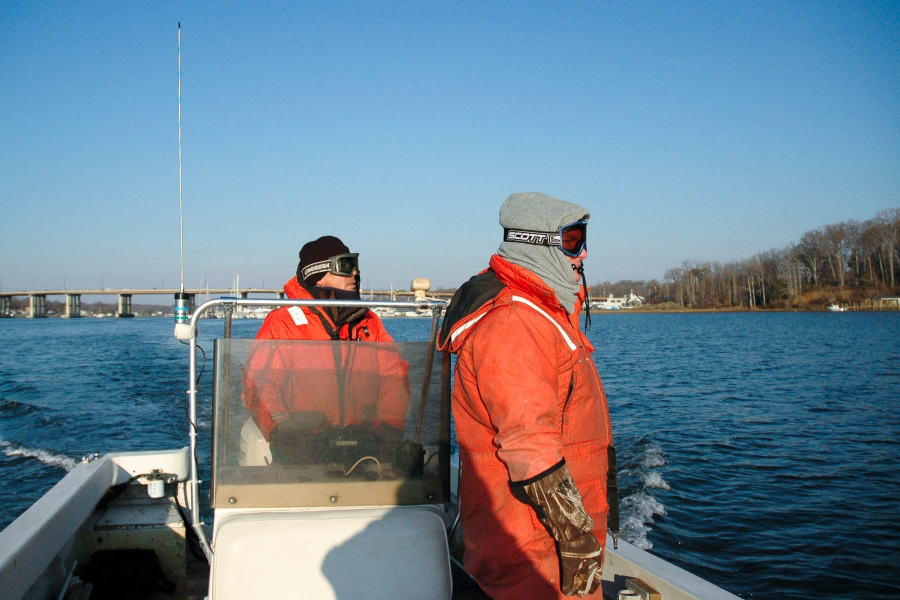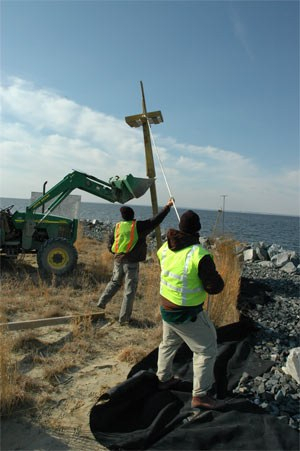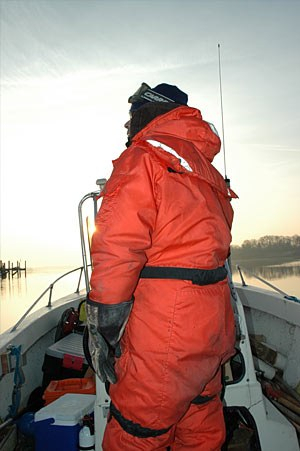Chesapeake Brrr! What it's like to work on the Bay in winter
Have you ever wondered what it's like to work on the water in the middle of winter? Wonder no more.

You may think being a Chesapeake Bay scientist is a fun, easy job, but have you ever wondered what it's like to work on the water in the middle of winter? U.S. Fish & Wildlife Service biologists Pete McGowan and Chris Guy give you a first-hand account of their experiences on the Bay in the frigid cold. It may be freezing, but as you'll read, they wouldn't want to be anywhere else.
The weatherman is calling for another frigid day with high temperatures just above freezing. Most people have long since winterized their boats and would not dream of boating 20 miles down the South River and across the Chesapeake Bay, putting on waders and plodding through thigh-deep (often ice-topped) water, to see if muskrats are active. But then again most people are not U.S. Fish and Wildlife Service biologists working at the Paul S. Sarbanes Ecosystem Restoration Project at Poplar Island, better known (and easier to say) as Poplar Island. We remain very active outdoors even in the coldest of weather.
Before you pity us, let us tell you that winter is often our favorite time to be out working in the marshes and Chesapeake Bay. In fact, while working in the hot and humid days of July and August, we often talk about those cold winter days without mosquitoes and biting flies, when the vegetation has died back and the marsh has frozen, making it easier to walk and do our work.

Often in the warmer months we are dodging thunderstorms and are rushed in our work because eggs are hatching, the chicks are fledging and everything seems to be coming at once. In the winter things slow down a bit and we can take the opportunity to regroup and prepare for the upcoming nesting season. This is the time of year when we build, repair, and install osprey platforms and bird boxes, and use old Christmas trees to develop snags for egrets to roost and nest upon. The Christmas trees also provide cover and nesting cavities for black ducks.
Boating is a little more relaxed, as you rarely see another boat on the water, and we can move freely without getting in anyone’s way or having them in our way. In this sense, winter is a time to pause and think about what we have accomplished and what we want to accomplish. It is a time of hope and optimism in our efforts to restore the Chesapeake Bay.
This is not to say that winter is an easy time to be a wildlife biologist. During the winter we have the real and ever-present threat of cold, icy water. Although we do not often speak of it, it is always on our minds. Unlike cars, most boats (including ours) do not have heating; the only heat we have available is that generated by the crew in our 25’ Boston Whaler. Did we mention there is only room for one or two people in the cabin? This means that on most days the crew rides outside and often has to deal with a formidable wind chill. Even on the calmest of days when the boat is operating at speeds of 25-30 knots, an air temperature of 32 degrees Fahrenheit equates to a wind chill of 17 degrees. Then there are the days where icing on the gunnels and deck (and at times the crew) from boat spray adds an extra layer of slipperiness to our day. And of course, there is always the task of shoveling fresh snow from the boat’s deck. Last year’s record snowfall made for lots of shoveling.

During extreme cold periods when ice forms on the rivers and Bay, trying to get our boat out of the marina can be frustrating. On many occasions while departing the South River this winter, we have had to break skim ice for miles. We are always checking to make sure it is not so thick that we will get stuck, or worse, put a hole through the boat’s fiberglass hull. Our boat is supposed to be one that can be cut in half and won’t sink, but who really wants to put that theory to the test in the middle of winter?
We prepare for the cold mostly by layering on the clothes, with as many as four layers to separate our flesh from the cold elements. Then there is the bulky survival suit with built-in flotation, plus hats, scarves, gloves and heavy boots. All these layers reduce our flexibility, not to mention causing us a bit of discomfort (try carrying around an extra 50 pounds of clothes when you work). Believe us, you need a lot of extra time if you need to use the bathroom! We often joke that the hardest part of our day is getting dressed and undressed.
Winter weather conditions wreak havoc on field gear. Batteries in electronics such as cameras, GPS units and field computers drain faster in cold temperatures. And trying to write field notes can be a bear when your fingers are numb.

Not to be forgotten is that pinhole leak in waders or gauntlet gloves that you can never seem to find and repair, and always seems to get bigger when standing or working in cold water. This makes for extended uncomfortable conditions, particularly when temperatures are near or below freezing. Drying these and other wet field items always takes longer in winter, too.
On a crisp winter day when the air is still, sometimes we just stop and wait to see the world around us. We see the marsh hawks that have come to the Chesapeake Bay for the winter zigzagging around the marsh looking for field mice and voles; what a thrill when they find one! There are always a few bald eagles around, either perching on an osprey nest or majestically soaring through the air. The great blue herons are always present and never seem to mind the cold. Short-eared owls and the occasional snowy owl will show up in the winter, and it is alwaysa real treat to get a glimpse. Then there are the wintering waterfowl – puddle ducks, diving ducks, bay ducks and sea ducks – as they fly into the Bay and marshes in the thousands.
Winter is an active and lively time on the Chesapeake Bay. It is amazing to think that we have an opportunity to experience something that few others get to, especially considering we are doing it within 40 miles of the Washington/Baltimore metropolitan area. We wouldn’t trade our jobs in any season.
All photos courtesy Pete McGowan and Chris Guy, U.S. Fish & Wildlife Service

Comments
There are no comments.
Thank you!
Your comment has been received. Before it can be published, the comment will be reviewed by our team to ensure it adheres with our rules of engagement.
Back to recent stories